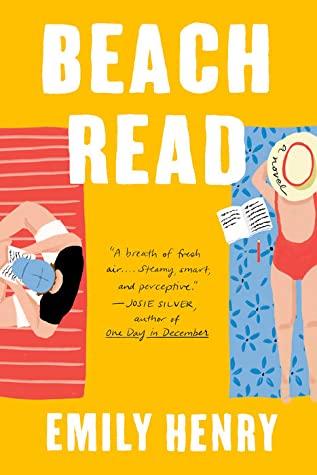 I had a discussion with a friend recently about what makes someone associate a movie with a particular season. This started because I said that Catch Me if You Can is a Christmas movie (despite having little to do with Christmas) and Mean Girls is a Halloween movie (despite having a very famous Christmas scene). Sometimes, it’s simply about the ephemeral phenomena we like to call vibes. It’s not really explainable, but you know it when you see it—or, more accurately, feel it. So what makes a beach read, a beach read? Does it even require a beach?
I had a discussion with a friend recently about what makes someone associate a movie with a particular season. This started because I said that Catch Me if You Can is a Christmas movie (despite having little to do with Christmas) and Mean Girls is a Halloween movie (despite having a very famous Christmas scene). Sometimes, it’s simply about the ephemeral phenomena we like to call vibes. It’s not really explainable, but you know it when you see it—or, more accurately, feel it. So what makes a beach read, a beach read? Does it even require a beach?
Since we’re still in summer’s sweaty thrall, it appears a lot of us have beach books on the brain; Book Riot recently posted an article titled “What Makes a Book a Beach Read?” and it got me thinking. Imagine lying on a pineapple blanket in the hot summer sun, the sound of crashing waves sprinkled with the sound of laughter, eating a popsicle and trying to read Anna Karenina. The disconnect is too great. Basically, when you’re stretched out in the sun (or the shade), you don’t want your brain to be doing too much work.
Before I go on, let me address the elephant in the room. Oftentimes, “beach reads” are synonymous with “women’s fiction”: light, fluffy, romantic, nothing too strenuous. Of course, this assumption has blatantly sexist roots, assuming that “books by women, about women, are more likely to be considered “light reading.”’ But let’s say that this flavour of “women’s fiction” actually is light reading—is that even a problem? I did just say I don’t want to use my brain. Perhaps women have just unlocked another level of enjoyment with this genre? The tension between “women’s fiction” and “literary fiction”—and that fact that those are considered two different things—is at the core of Emily Henry’s new novel aptly titled Beach Read. The plot is ripe for rom-com goodness: a struggling writer of women’s fiction moves into the beach house next door to—gasp!—her literary rival since college. Of course, the rival is an attractive, successful man. But Emily Henry uses this tropey set-up to explore what makes something a “beach read”; her main characters agree to swap genres (heavy literary fiction for romance) to overcome their respective writers block, and in doing so learn the value of each. Not just a beach-set rom-com, Beach Read—as its blunt title suggests—is a meta exploration of its genre.
 Some might call December holiday season. And it is! But it’s also the season of another cheerful, warming tradition: the romantic comedy. Think about it. What goes better with cozy twinkle lights and a steaming mug of tea than two people falling in love? With Hallmark finding new life with the Christmas rom-com boom—and Netflix getting in on the action—it seems like we’re all yearning for a little something sweet come the holidays. Personally, my current watch list is stocked with
Some might call December holiday season. And it is! But it’s also the season of another cheerful, warming tradition: the romantic comedy. Think about it. What goes better with cozy twinkle lights and a steaming mug of tea than two people falling in love? With Hallmark finding new life with the Christmas rom-com boom—and Netflix getting in on the action—it seems like we’re all yearning for a little something sweet come the holidays. Personally, my current watch list is stocked with